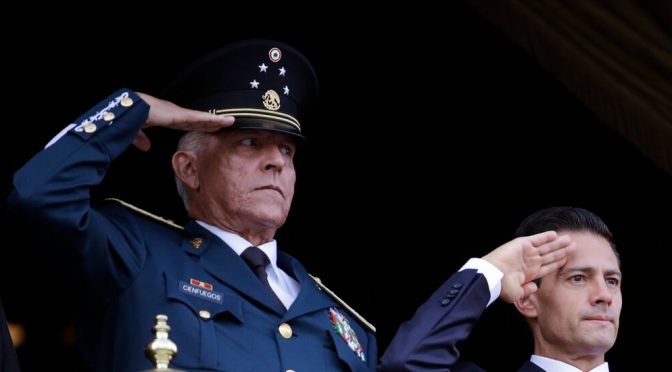MEXICO CITY — The authorities in Mexico say they will bring no charges against a former top military official who was arrested in the United States last year on drug-trafficking and corruption charges, only to be sent home at the request of the outraged Mexican government.
The former defense minister, Gen. Salvador Cienfuegos Zepeda, had been accused by the U.S. authorities of taking bribes in exchange for protecting drug cartel leaders. He was arrested at the request of the Drug Enforcement Administration in Los Angeles in October.
His complete exoneration in Mexico came as a shocking about-face after the authorities had promised to bring the full weight of the Mexican justice system to bear in the case. In November, the country’s foreign minister said that doing nothing after having demanded the general’s return to Mexico would be “almost suicidal.”
General Cienfuegos was apparently known as “El Padrino,” or The Godfather, by one of Mexico’s most violent drug cartels. Officials said General Cienfuegos directed military operations away from the criminal group in exchange for large sums of cash. But the Justice Department abruptly dropped the case against him in November, and he was allowed to return to Mexico.
Late Thursday night, the Mexican attorney general’s office said in a statement that General Cienfuegos — who served as defense minister in President Enrique Peña Nieto’s administration from 2012 to 2018 — “never had any encounter with the members of the criminal organization.”
They also said he had not provided any kind of protection to cartel members and had never received any “illegal income.”
General Cienfuegos, who was never placed under arrest in Mexico despite the evidence presented by U.S. officials, has now been cleared of all charges.
The news is a new blow to U.S. officials, particularly those in the State Department and in Congress, who were stunned by the Justice Department’s decision to free General Cienfuegos and allow him to face justice in Mexico.
Relations between the United States and Mexico over security operations have become increasingly fraught since the general’s arrest. In December, Mexican lawmakers approved legislation to regulate the activities of foreign agents in the country, potentially limiting cooperation with American narcotics officers.
The new law was greeted with immense frustration by U.S. officials, including William P. Barr, then the attorney general, who said in a statement that the bill would make “cooperation between our countries more difficult.”
Mike Vigil, a former chief of international operations at the Drug Enforcement Administration, told The Associated Press that clearing General Cienfuegos “could be the straw that broke the camel’s back as far as U.S.-Mexico cooperation in counter-drug activities.”
Yet General Cienfuegos’s exoneration has also prompted outrage in Mexico, particularly given that the Mexican authorities had vowed to fully investigate the accusations against him.
“The exoneration of Salvador Cienfuegos shows that the armed forces are untouchable,” Denise Dresser, a political analyst and frequent government critic, said on Twitter. “They act above the law.”
The Mexican military is an increasingly central pillar of President Andrés Manuel López Obrador’s strategy to tackle Mexico’s soaring rates of violence. It serves many other roles, too, including operating airports and distributing the coronavirus vaccine.
Under Mr. López Obrador’s government, which took office in December 2018, military spending has grown by almost 40 percent, according to local media. The defense ministry’s budget has outpaced the total received by eight other federal agencies combined, including the foreign ministry, the interior ministry and the economy ministry.
General Cienfuegos’s arrest had left Mexico’s military particularly incensed, with army officials pressing the government to take action.
Still, at a news conference in November, Foreign Minister Marcelo Ebrard said that “it would be very costly” for Mexico to “do nothing” after having asked for the charges against the former defense chief to be dropped and for him to be returned home.
“It would be almost suicidal,” Mr. Ebrard said.
But the fact that General Cienfuegos will face no charges is not altogether surprising in a country where impunity for the well-connected is exceptionally high, even for minor crimes, and where more than 90 percent of homicides go unsolved.
In its statement, the attorney general’s office said that General Cienfuegos was made aware on Jan. 9 of the charges against him by the U.S. authorities, as well as of the results of the Mexican authorities’ own investigation. The general was then allowed to offer evidence in his defense.
Less than a week later, all charges were dropped.
